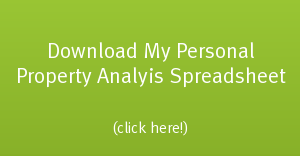I once asked Seth Godin (marketing genius and internet blogger) via email what he would change if he could go back and do it again. His response:
If I went back and changed something,
then things would be different and I wouldn’t be me.
But I like being me. So I’ll take this life
He makes a valid point. If we were to go back, it would change who we are. However, what about if we could help someone else learn from our mistakes?
People don’t like to dwell on mistakes. Our pride likes to say “I’m awesome” but the reality is we make mistakes all the time. While I’m sure it will hurt my image as an “expert,” I am going to talk about the mistakes I’ve made because I want to save others from making the same ones. This article is designed to help you learn from those mistakes and hopefully avoid them yourself! Without further ado, my five biggest mistakes I’ve had in my investment career:
- Not Saving Enough – I have been lucky, but stupid. When I started investing in real estate, I had no money. I bought my first property with close to nothing down and was fortunate enough to sell it and made a decent profit. While I am completely in support of investing with no money down, I believe any investor needs to have at least some money in savings because the road to real estate riches is a bumpy one.
- Using Credit Cards – Building off number one, because I didn’t have solid financial resources, I often turned to credit cards to finance various things. I wish I had never used them. When I first started, I bought into the “credit cards are a tool” mentality, which caused me to quickly max out several cards during rehabs. This is fine when the market is great and the proceeds from the flip can pay off the card, but when the market turned and I turned those rehabs into rentals, the credit cards didn’t get fully paid off. I have spent the past four years tackling them now. As Dave Ramsey likes to say, debt is slavery.
- Renting To Family – I’d heard it said a thousand times but still fell into this trap. Do not rent to family. Ever. I’m sure you can think of many reasons that this could turn out bad – and they are all true. As a landlord, you will always be seen as a “greedy” S.O.B. by your tenants, so it is best not to have one of those tenants be in your family.
- Renting to Friends- Similar to number four above, renting to friends is a mistake. I have rented to friends and it has turned out great, but the few times it has turned out bad it turned out REAL bad. It simply isn’t worth it.
- Not Learning From A Mentor – Most of my mistakes could have been solved by simply listening to someone who had been there before. If I could go back, I’d have joined my local real estate investment club immediately, followed around the good investors until they were sick of me, worked for free on a flipping crew to see how it was done, and become a real estate expert before ever spending a dollar on investments.
That said, I know that if I were to go back and change things, I would not be where I am today and I like where I am. However, I believe strongly in the importance of learning from mistakes as to avoid future ones and help others avoid the same.
Are there things you wish you had known? What would you change if you could go back? What can you teach others from your mistakes?
P.S. looking for hard money loans in California? Be sure to check out my friends over at northcoastfinancialinc.com. They have very competitive rates, can fund within a week and specialize in fix and flip loans and other hard money loans.

 If this is your first time here at Real Estate In Your Twenties.com - welcome!
If this is your first time here at Real Estate In Your Twenties.com - welcome! 





